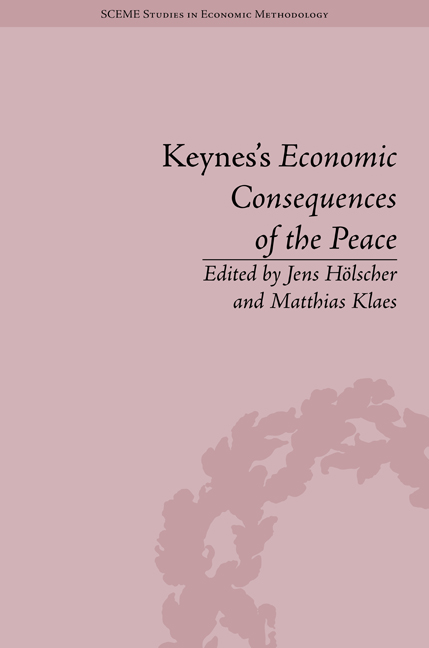Book contents
- Frontmatter
- CONTENTS
- List of Figures
- List of Contributors
- Introduction: Standing the Test of Time: Maynard Keynesas's Economic Consequences of the Peace, a Century On
- Part I The Consequences in their Time
- 1 Reparations, Orthodoxy and Fascism
- 2 What Literary Criticism Tells us about Keynes's Economic Consequences of the Peace
- 3 The Reception and Impact of Keynes's Economic Consequences of the Peace in Turkey
- 4 The Essays in Persuasion of John Maynard Keynes and their Relevance for the Economic Problems of Today
- Part II The Consequences Today
- Part III Keynes: A Play
- Notes
- Index
4 - The Essays in Persuasion of John Maynard Keynes and their Relevance for the Economic Problems of Today
from Part I - The Consequences in their Time
- Frontmatter
- CONTENTS
- List of Figures
- List of Contributors
- Introduction: Standing the Test of Time: Maynard Keynesas's Economic Consequences of the Peace, a Century On
- Part I The Consequences in their Time
- 1 Reparations, Orthodoxy and Fascism
- 2 What Literary Criticism Tells us about Keynes's Economic Consequences of the Peace
- 3 The Reception and Impact of Keynes's Economic Consequences of the Peace in Turkey
- 4 The Essays in Persuasion of John Maynard Keynes and their Relevance for the Economic Problems of Today
- Part II The Consequences Today
- Part III Keynes: A Play
- Notes
- Index
Summary
Introduction
As is known, the Essays in Persuasion of John Maynard Keynes constitute a relevant attempt to find a solution to the most urgent problems of the post-World War I period. For this reason, their importance goes well beyond the sphere of economics for reaching out to the realms of history, politics and international relations.
Keynes's Essays are significantly related to Economic Consequences of the Peace for two main reasons: first, because the first part of the Essays, ‘The Treaty of Peace’, contains the most important insights developed in Economic Consequences; and second, because, as made clear by Keynes himself in the introduction, all the major issues addressed in the five parts of the Essays – ‘The Treaty of Peace’, ‘Inflation and Deflation’, ‘The Return to the Gold Standard’, ‘Politics’ and ‘The Future’ – are extremely intertwined and, for this reason, require a more unifying approach for their full understanding. In this regard, it is worth noting that the economic and political perspective set forth in the Economic Consequences constitutes the factual and conceptual springboard for Keynes's subsequent contributions.
In this chapter I wish to point out the distinctive role of the Essays in the elaboration of the central concepts of his new perspective in economics – in particular, the notions of stable and peaceful relations, international cooperation, effective demand, freedom and social justice, links between short-term and long-term perspectives, structural ties between economic and psychological dimensions, and the role of pro-active policies – which lie at the heart also of the theoretical formulation later expounded in The General Theory.
- Type
- Chapter
- Information
- Keynes's Economic Consequences of the PeaceA Reappraisal, pp. 83 - 96Publisher: Pickering & ChattoFirst published in: 2014



